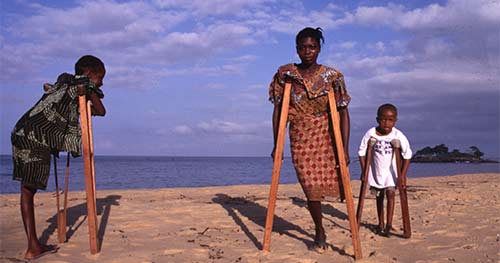Post conflict reconciliation: Societal healing but reduced psychological health
Sierra Leone: A new study suggests reconciliation programmes promote societal healing, but that these gains come at the cost of reduced psychological health, worsening depression, anxiety, and trauma.

An ICRC rehabilitation centre for those wounded in Sierra Leone’s civil war. More than 50,000 people were killed, thousands more suffered forceful amputations, and over half the population was displaced. Much of the violence took place within communities, with members from the same villages taking up arms against each other (Photo: Till Mayer / ICRC)
Civil wars divide nations along social, economic and political lines, often pitting neighbours against each other. In the aftermath of civil wars, many countries undertake truth and reconciliation efforts to restore social cohesion, but little has been known about whether these programs reach their intended goals.
"Our research suggests that talking about war atrocities can prove psychologically traumatic for people affected by war. Invoking war memories appears to reopen old war wounds," said Oeindrila Dube, Assistant Professor of Politics and Economics at New York University and one of the authors of the study. "At the same time, the reconciliation programme we examined was also shown to improve social relations in communities divided by the war."
The programme, which was designed and implemented by Fambul Tok (‘Family Talk’ in Krio), a Sierra Leonean NGO, brought victims face to face with perpetrators in community forums. Victims detailed war atrocities; perpetrators admitted to crimes and sought forgiveness for their actions; and no one was compensated financially or punished for participating. The forums in the study took place 2011-2012, a decade after the civil war ended.
Researchers Jacobus Cilliers, of the McCourt School of Public Policy at Georgetown University, Dube of New York University, and Bilal Siddiqi, an economist at the World Bank’s Development Research Group, worked with the research and policy nonprofit Innovations for Poverty Action (IPA) to conduct an independent, randomised evaluation of the program. The study took place across 200 villages, 100 of which were randomly chosen to be offered the reconciliation program. The research team tracked 2,383 people in both sets of villages, recording their attitudes towards former combatants, their mental health, and the strength of their social ties nine and 31 months after the program.
The results, which were published in May in Science, revealed that reconciliation had both positive and negative consequences. On the one hand, it promoted societal healing: forgiveness of former perpetrators increased substantially in programme villages relative to control villages. Trust of former combatants also increased by 22.2 per cent while trust of migrants (many perceived to be former combatants) increased by 6.7 per cent. In addition, social network strength increased by 11 per cent, as individuals formed more friendships and relied more on one another for advice and help.
Additionally, those living in programme villages participated more in community groups and contributed more resources toward public goods, including those used to build schools and health clinics.
On the other hand, these gains came at the cost of reduced psychological health: the program worsened depression, anxiety and trauma. For example, the prevalence of clinical PTSD, or severe trauma, was 36 per cent higher in programme villages than in comparison villages, where the prevalence of clinical PTSD was eight per cent. Both positive and negative effects persisted for up to 31 months after the programme ended.
"Our results in no way undermine the need for reconciliation, but suggest that policymakers need to find ways to mitigate the negative effects of confronting war memories when designing these programmes," said one of the researchers.